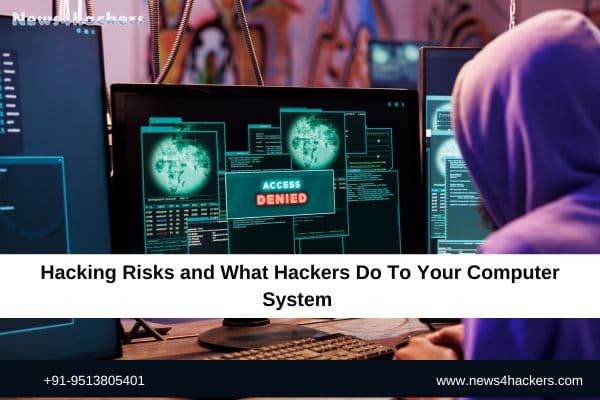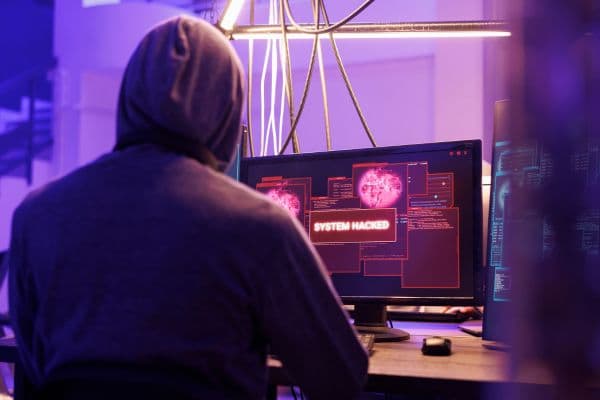Hacking Risks and What Hackers Do To Your Computer System

Hacking Risks and What Hackers Do To Your Computer System
How Hackers Operate & Ways to Protect Yourself?

People, not machines, cause computer risks. Computer predators victimize people for their advantage. A predator’s threat to your security increases dramatically if they have access to your PC and the Internet.
Hackers on computers are unapproved users who breach computer systems to take, alter, or destroy data. They frequently do this by inadvertently downloading harmful viruses without your knowledge or agreement.
They can obtain information you don’t want them to have thanks to their cunning strategies and in-depth technical expertise.
How do hackers find you?
Anyone who uses a computer connected to the Internet is subject to the hazards that computer hackers and online predators represent. These online villains generally utilize cyber scams, spam emails or instant messages, and phony websites to send deadly viruses to your computer and damage your computer security.

If you don’t have a firewall protecting you, cybercriminals may potentially attempt to gain direct access to your computer and personal data. They can view your private website’s back end or keep an eye on your interactions.
Predators, who typically pose as someone else, can trick you into disclosing private information about yourself or your finances, or even worse.
Things that a hacker can do to you?

Your financial and personal information is silently transmitted without your knowledge or agreement by the virus a hacker has installed on your computer when it is connected to the Internet.
Alternatively, a cyber predator can take advantage of the personal data you inadvertently disclosed. Either way, they’ll be capable of:
- Conceal your passwords and usernames.
- Open bank and credit card accounts in your name and pilfer your money.
- Damage your credit.
- Ask for more credit cards or Personal Identification Numbers (PINs) for new accounts.
- Make purchases.
- For faster credit usage, add yourself or an alias under your control as an authorized user.
- Obtain cash advances.
- Utilize your Social Security number improperly.
- Sell your information to third parties so they can use it for nefarious or unlawful activities.
People who are stalked online by predators may be seriously threatened physically. The best approach to staying safe is to always proceed with extreme care when agreeing to meet an online “friend” or acquaintance in person.
Know, if you’ve been hacked?
Verify the information on your credit cards, personal accounts, and paperwork. Exist any transactions that make no sense? Unauthorized or dubious changes? If so, it could be due to a malicious virus that hackers or predators installed.

What can I do about computer hackers and predators?
You can become more knowledgeable about computer security threats and less susceptible to deceptive tactics by arming yourself with resources and information. While both hackers and predators are extremely dangerous, they provide very different risks.

Protect yourself while online
- Make sure personal accounts are accurate at all times, and take immediate action if there are any irregularities.
- When uploading personal web pages or accessing chat rooms, proceed with extreme caution.
- Restrict the amount of private information you share on your own web pages.
- Keep a close eye out for predatory activity in requests made by online “friends” or acquaintances.
- Don’t share money or personal information in Internet chats.
- When consenting to meet an online “friend” or acquaintance in person, proceed with great caution.
Security Tips to Prevent Hacking
- Employ a two-way firewall.
- Regularly update your operating system.
- Boost the security settings of your browser.
- Steer clear of dubious websites.
- Download software only from reputable websites. Before downloading, give free software and file-sharing programs a thorough evaluation.
Practice safe email and virus/malware protocols
- Never open emails from senders you are not familiar with.
- Delete any emails you believe to be spam right away.
- Verify that your computer is running the finest security software packages:
- Make use of antivirus software.
- Obtain protection from antispyware software.
Secure Yourself Against Risky Online Threats
For online predators and hackers, an unprotected PC is like an open door. Going one step further, safeguard your computer from cyberattacks by scanning incoming emails and instant messages with a spam filter or gateway.
Products like Webroot Antivirus and Webroot Internet Security completely guard against harmful malware before it even reaches your computer, and block any attempts to access it, even the most cunning and destructive strains of spyware.
Although there are free antivirus and anti-spyware programs available, they are unable to keep up with the constant barrage of new malware strains. It is essential to have guaranteed security that is up to date because malware that has gone undetected in the past frequently has the potential to cause the most damage.

About The Author
Suraj Koli is a content specialist with expertise in Cybersecurity and B2B Domains. He has provided his skills for the News4Hackers Blog and Craw Security. Moreover, he has written content for various sectors Business, Law, Food & Beverage, Entertainment, and many others. Koli established his center of the field in a very amazing scenario. Simply said, he started his career selling products, where he enhanced his skills in understanding the product and the point of view of clients from the customer’s perspective, which simplified his journey in the long run. It makes him an interesting personality among other writers. Currently, he is a regular writer at Craw Security.
READ MORE ARTICLE HERE








